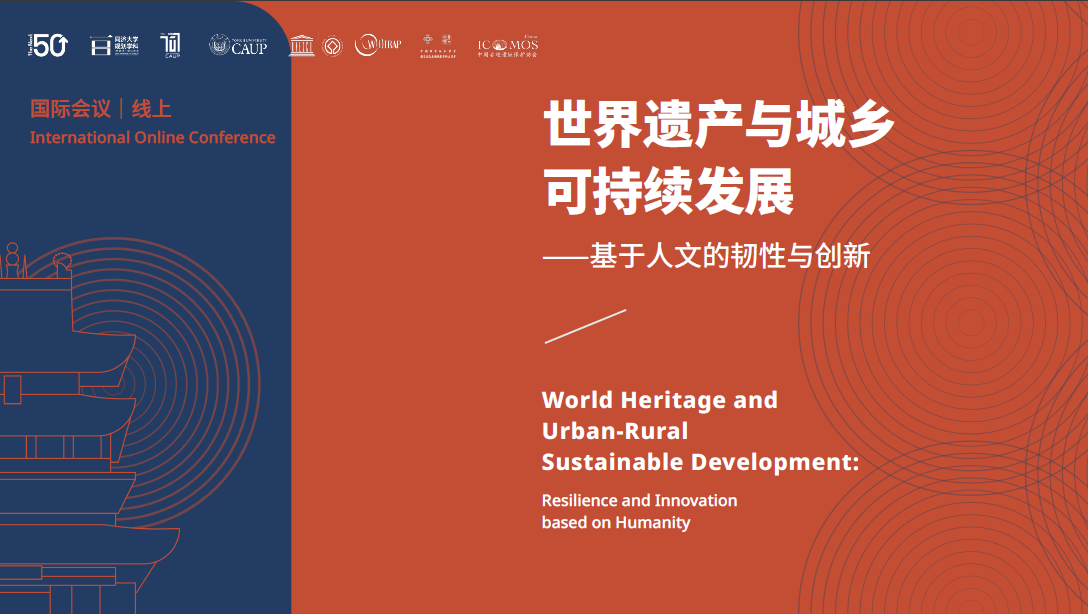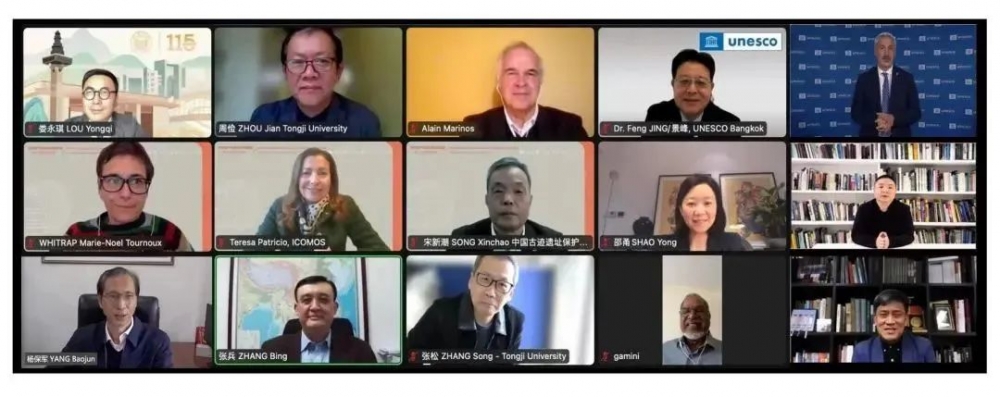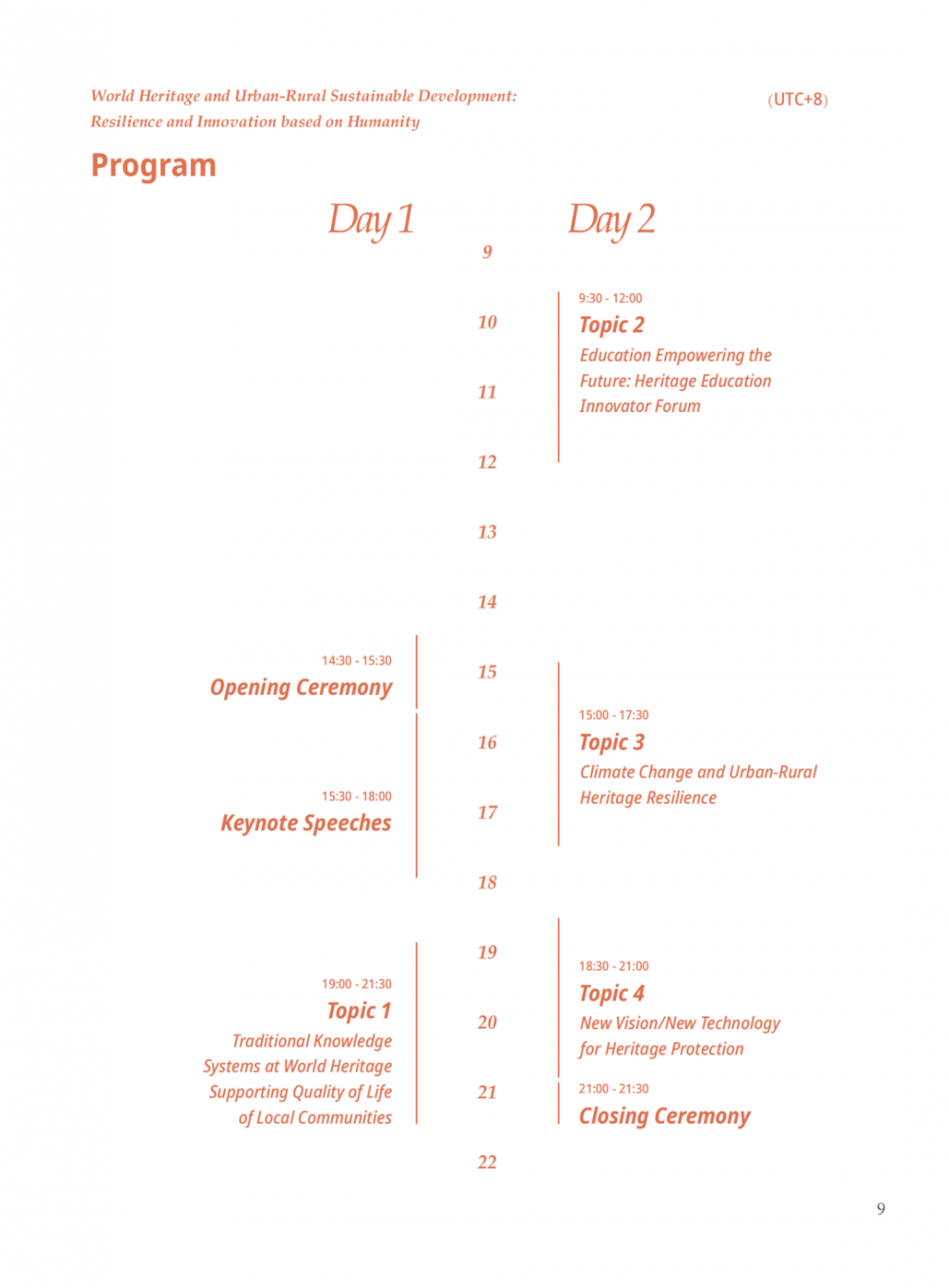
The year 2022 marks both the 50th anniversary of the World Heritage Convention and the 40th anniversary of China’s National Famous Historical and Cultural Cities Protection System. The year is also the 70th anniversary of the College of Architecture and Urban Planning (CAUP) of Tongji University at Shanghai and the Tongji Planning Centennial, the 100th year since the university launched its first planning course. To join the worldwide celebration for the World Heritage Convention's 50th anniversary focusing on “The next 50: World Heritage as a source of resilience, humanity and innovation”, CAUP of Tongji University and World Heritage Institute of Training and Research for the Asia and the Pacific Region (WHITRAP Shanghai) have planned and organized a series of academic and public activities over 10 months from June 2022 to March 2023.
Launched on June 11th on China’s “Cultural and Natural Heritage Day, six World Heritage Dialogues were held from 11 June to 2 November. They each focused on a different theme: “World Heritage and Quality of Life”, “Rural Heritage”, “Digital Tools for heritage”, “Climate Change and Resilience”, “Large Scale Properties” and “Filling the Gap between Culture and Nature”. The Dialogues are knowledge sharing roundtable discussions focusing on the conservation and management experiences of World Heritage, the strength and relevance of the World Heritage Convention, and the balance between conservation and development approaches through experiences and examples from the Asia and Pacific region.
On November 15th and 16th, CAUP of Tongji University, WHITRAP Shanghai, the Academic Committee for Conservation Planning of Famous Historical and Cultural City – Urban Planning Society of China, and ICOMOS China, successfully held an online international conference on “World Heritage and Urban-Rural Sustainable Development: Resilience and Innovation based on Humanity”, commemorating the 50th Anniversary of the World Heritage Convention, the 40th Anniversary of China’s National Famous Historical and Cultural Cities Protection System.
On the opening ceremony, Professor Lou Yongqi, the Vice President of Tongji University, Mr. Ernesto Renato Ottone Ramirez, Assistant Director-General of UNESCO for Culture, Mr. Yang Baojun, Chief Economist of the Ministry of Housing and Urban-Rural Development of the People’s Republic of China and President of the Urban Planning Society of China, Ms. Teresa Patricio, President of ICOMOS, Mr. Zhang Bing, Director-General of Territorial and Spatial Planning Bureau, Ministry of Natural Resources of the People’s Republic of China, Mr. Song Xinchao, President of ICOMOS China, and Professor Li Xiangning, Dean and Professor of the College of Architecture and Urban Planning, Tongji University, delivered speeches to congratulate the successful convening of the conference and exhibition, and also expressed their wishes for further cooperation on the protection of world heritage and sustainable urban and rural development.
See more information about Keynote Speeches on the opening ceremony: http://heritap.whitr-ap.org/index.php?classid=12483&id=276&t=show

Group photo of experts at the opening ceremony
The International Conference addressed four key topics: traditional knowledge systems at world heritage supporting quality of life of local communities, education empowering the future - heritage education innovator forum, climate change and urban-rural heritage resilience, new vision/new technology for heritage protection. The participating experts have reached the following consensus:
Topic 1
Traditional Knowledge Systems are reflected in the indicators of the quality of life connecting to the four dimensions of sustainable development. Communities have played a key role in traditional knowledge systems of the World Heritage site, therefore their values should be recognized, respected and understood, which will contribute to sustainable urban and rural development through heritage conservation and management. The traditional knowledge systems are dynamic, continuously optimized and have endured the testing of time. They link to every aspects of community life, such as enhancing community resilience, improving quality of life, and realizing the positive interaction with urban and rural sustainable development.
See more relevant information: http://heritap.whitr-ap.org/index.php?classid=12483&id=277&t=show
Topic 2
Building an international platform on World Heritage education that links cultural heritage with other high-end innovation resources is a core strategy for the transformation and upgrading of heritage conservation and utilization. The current global trend of heritage education features both diversity and regional imbalance. We are obliged to a collective effort to facilitate cross-border cooperation and balanced development. This is the best way to promote innovative development mode for heritage sites. Heritage education provides an opportunity on a global scale. World Heritage education is experiencing significant reform and innovation. New forces are constantly emerging in the development of cultural tourism and cultural products, and by primary and secondary education institutions and local governance as well to promote a new wave of innovation and reform. We believe that the fWorld Heritage education is heading toward a brighter future.
See more relevant information: http://heritap.whitr-ap.org/index.php?classid=12483&id=278&t=show
Topic 3
The topic on “climate change, World Heritage conservation and urban and rural heritage” involves diverse issues. Be it natural or built heritage, we have to admit that climate change brings with it environmental and social changes, thus the awareness of dynamic observation is increasingly important and will directly affect the adaptive management of heritage sites and historic cities. Action is important. In the face of climate change, we should put into practical actions based on adequate research. In addition, adaptation is an option for action in response to climate change; and the fight against climate change to strengthen the resilience of buildings and cities requires the participation of all. The conservation of archaeological sites and historic cities provides an effective tool and a source of innovation for climate change response. The traces and models signifying how people coexisted with their natural environment in history that have been found in ancient sites and historic cities, provide ideas for strengthening the resilience of modern cities.
See more relevant information: http://heritap.whitr-ap.org/index.php?classid=12483&id=282&t=show
Topic 4
Digital technology has provided important support for the promotion of the World Heritage Convention and the development of the World Heritage system, enabling the sharing and dissemination of heritage information and the innovation of the way heritage knowledge is produced. As the application of technology deepens, exploring and studying digital heritage has become a new topic and a responsibility of the times for the World Heritage. Digital technology provides us with important support for monitoring, documenting, interpreting and presenting World Heritage. RS and big data technology is an important scientific tool for World Heritage monitoring and conservation, providing strong support for achieving sustainable development goals. Digital interpretation technologies can bring history and people closer and revitalize World Heritage sites for contemporary revival. Mixed reality and gaming technologies can create new heritage experiences and overlay different cultural perspectives. Research proves that there is a strong link between heritage and health, and enhances human well-being. We should enable interaction/cooperation between different sectors and actors, from people to communities and nations, to international cooperation. Technologies allows us to develop new methods of interpretation and the sharing of knowledge. Develop new meanings of heritage through digital technology, and expand the types of heritage protection and utilization.
See more relevant information: http://heritap.whitr-ap.org/index.php?classid=12483&id=283&t=show
For more information on the Conference, please refer to the documents below:
Concept Note
In 2021, the Fuzhou Declaration was adopted at the 44th session of the World Heritage Committee of UNESCO, which highlights a series of important ideas, including a shared future for mankind, global cooperation and the linkage between cultural and natural heritage. The Declaration also calls for academia, civil society and communities’ wide participation, so as to vigorously strengthen the link between heritage conservation and socio-economic development activities.
The year 2022 marks both the 50th anniversary of the World Heritage Convention and the 40th anniversary of China's National Famous Historical and Cultural Cities Protection System. The year is also the 70th anniversary of the College of Architecture and Urban Planning (CAUP) of Tongji University at Shanghai and the Tongji Planning Centennial, the 100th year since the university launched its first planning course. To joining the celebration for “The next 50: World Heritage as a source of resilience, humanity and innovation”, CAUP of Tongji University and World Heritage Institute of Training and Research for the Asia and the Pacific Region (WHITRAP, Shanghai) are organizing a series of academic activities from June 2022 to March 2023.
The 10-month series of academic and public activities jointly planned and organized by the two institutes include:
Starting from China’s “Cultural and Natural Heritage Day” on June 11, a monthly World Heritage series dialogues has been launched with the themes of 6 sessions successively as “World Heritage and Quality of Life”, “Rural Heritage”, “Digital Tools for Heritage”, “Climate Change and Resilience” and “Large World Heritage and Serial World Heritage” and “Filling the Gap between Culture and Nature”. The dialogues are knowledge sharing in the form of roundtable discussions, aiming to showcase and discuss the conservation and management experience of World Heritage Sites, the strengths and importance of the World Heritage Convention, and better balance and promotion between conservation and development approaches to experience in the Asia-Pacific region. Please refer to the official we-chat account of “WHITRAP” for detailed information and summaries.
On 15 to 16 November, CAUP of Tongji University, WHITRAP Shanghai, the Academic Committee for Conservation Planning of Famous Historical and Cultural City – Urban Planning Society of China, and ICOMOS China, with the support of UNESCO World Heritage Center and ICOMOS, have planned an online international conference on World Heritage and Urban-Rural Sustainable Development: Resilience and Innovation based on Humanity (15 to 16 November 2022) and an online public exhibition on World Heritage Cities: Past, Present and Future(16 November 2022 to 31 March 2023).
The Conference aims to facilitate international dialogue and exchange, to promote the “Policy Document on World Heritage and Sustainable Development” and the World Heritage City Programme of UNESCO, and to implement the “Opinion on Strengthening the Protection and Inheritance of Historic and Cultural Heritage in the Course of Urban-Rural Development” issued by the General Office of the CCCPC and the General Office of the State Council.
The four-and-a-half-month online public exhibition, as an extension of the conference, is also an attempt to expand the exploration of heritage topics beyond the academia to reach to the public domain. The organizers hope to inform the public of the innovative mechanism featuring a spirit of international cooperation forged by the World Heritage Convention in the past 50 years, the knowledge of Outstanding Universal Value and the diversity of World Heritage cities, and the latest cases among the “Historic Urban Landscapes (HUL)” and World Heritage Cities programmes initiated by UNESCO World Heritage Center. The event also aims to present the profound culture and the unique oriental charm of Chinese historical cities, and to give an introduction to the “Imagination of Heritage: Original Paintings of Pingyao Picture Books”, a cocreation programme among professional institutions, public welfare teams and a group of young artists. A series of activities will be organized during the exhibition to lead the public into a more detailed realm of the World Heritage cities/famous historical and cultural cities, where the essence of human civilizations has crystallized, be it from the past, in the present or for the future, so as to explore more creative and diversified approaches to the protection, interpretation, presentation, and utilization of those heritage.
program


